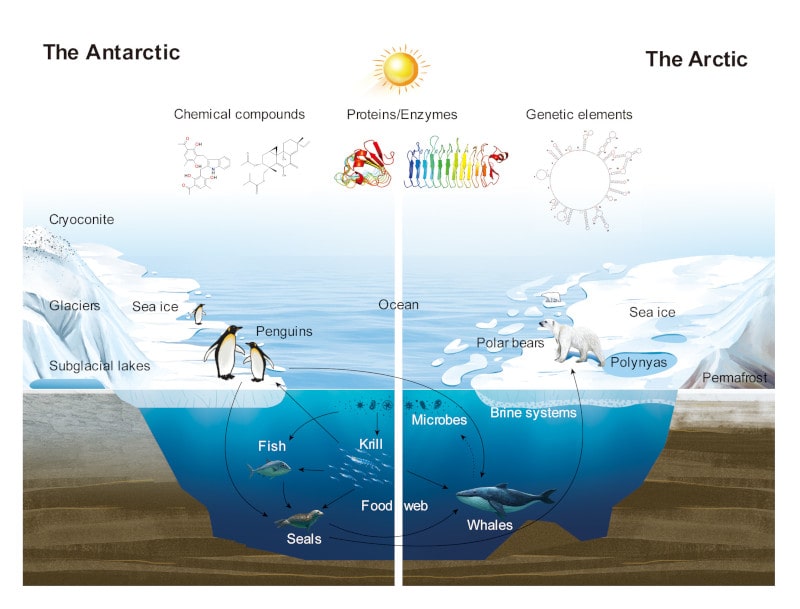The Polar Regions host one of the harshest and most unique ecosystems on Earth, harboring a diverse array of micro- and macro-organisms. These inhabitants showcase remarkable taxonomic and genetic originality, presenting unparalleled opportunities for bioprospecting, alongside demonstrating extraordinary adaptation mechanisms for survival. Furthermore, polar organisms play crucial roles in facilitating organic matter decomposition, carbon fixation and sequestration, and biogeochemical cycling.
Moreover, these organisms serve as pivotal indicators of global climate shifts. Therefore, exploring the polar organisms and the ecosystem holds profound and significant implications for gaining deeper insights into scientific frontiers such as global biodiversity, elementary cycling, climate change, resource utilization, and the awe of life in extreme environments.
With the rapid development of multi-omics technologies, biodiversity, adaptability, interspecies interactions, and ecosystem functions are explored with unprecedented depth and breadth, with innovative outcomes continuously emerging. To foster the dissemination of cutting-edge research in polar biology and ecology, and to encourage interdisciplinary collaboration, Advances in Polar Science (APS) invites the following esteemed researchers to form a guest editorial team for co-hosting of publishing a Special Issue titled “New Horizons in the Exploration of Polar Biodiversity, Ecosystem and Genetic Resources”: Professor Mukan Ji , Researcher Maggie C. Y. Lau Vetter, Researcher Li Liao, Professor Ben Luisi, Researcher Changwei Shao and Professor Xiying Zhang. This special issue will be published in December 2025, as the general issue (Vol. 36, No.4) of APS, with an expected publication of around 10 articles.
Advances in Polar Science (APS)
APS is an international, peer-reviewed and open-access journal sponsored by the Polar Research Institute of China (PRIC) and Chinese Society for Oceanography (CSO). Since 2015, APS has become more truly international, and been improving, with its inclusion in Elsevier’s Scopus, the largest abstract and citation database of peer-reviewed literature in May of 2020. Articles published on APS are free of charge with generous funding from PRIC. APS pays particular attention to publishing original papers from early career scientists.
Deadlines
As this will be a scheduled special issue, there will be strict adherence to the following deadlines.
- 30 April 2025 — deadline for submitting abstracts of possible contributions;
- September 1, 2025 — deadline for submitting a manuscript for this issue;
- December 15, 2025— deadline for submission of the final accepted paper;
- December 30, 2025 — publication date.
Themes
The themes of the special issue include, but are not limited to:
- Polar Biodiversity: distribution patterns and genetic diversity of polar micro- and macro-organisms.
- Functions and Services of Polar Ecosystems: the functions of polar ecosystems in material cycling, biodiversity maintenance, and their relationships with climate change.
- Interspecies Interactions in Polar Regions: symbiotic, competitive, and predatory relationships among species in polar ecosystems and their interactions in the dynamic evolution of community structure.
- Adaptation to Extreme Environments: adaptation mechanisms of polar organisms to extreme environmental conditions (low temperature, high radiation, high salinity, etc.).
- Polar Bioresources: exploration of bioresources (proteins, polysaccharides, small molecule products, etc.) from polar micro- and macro-organisms and assessment of their application potentials.
- New Methods and Technologies in Polar Biology Research: innovative applications of microbial isolation and cultivation techniques, extraterrestrial life detection technologies, and artificial intelligence technologies.
For more details, visit the Advances in Polar Science website

